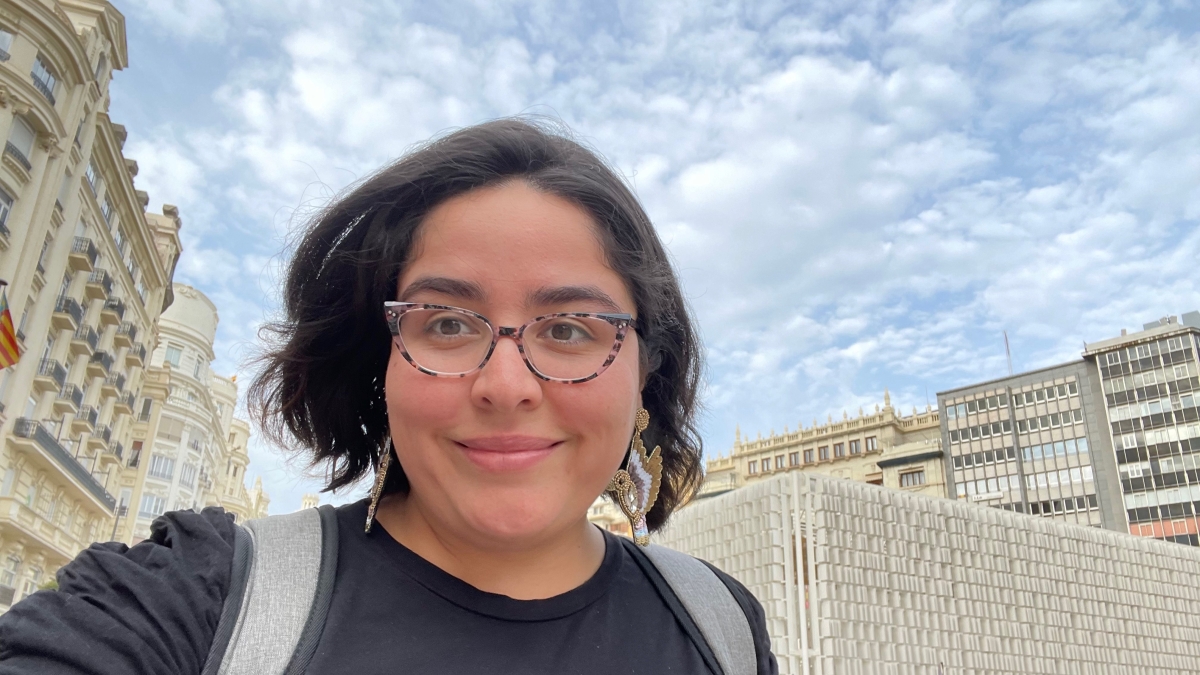ASU PhD student examines the trans experience in Spain through photos, research work

Mirtha Garcia Reyes conducting fieldwork in Valencia, Spain. Photo courtesy Mirtha Garcia Reyes
An anthropology PhD student is working to honor and highlight the experiences and life stories of transgender and other LGBTQ community members in Valencia, Spain, using their own photos and words.
“Spain ended their Franco dictatorship not too long ago,” says Mirtha Garcia Reyes. “So for people going from a dictatorship to a democracy in such a quick time with so many changes in place, I wanted to see what were the effects on the day-to-day lives of individuals of the trans community and see if things were actually changing for them.”
Garcia Reyes is a sociocultural and visual anthropology PhD student at the School of Human Evolution and Social Change at Arizona State University. She is researching the experience of migrant and nonmigrant trans individuals living in Valencia with a goal of helping create policies and academic work that will help the trans community globally.
She becomes emotional talking about the people she met, the people who welcomed her into their lives, shared their stories, their triumphs and also the stereotypes and violence they still face daily.
“The reason I love what I do is because I get to interact with people in a way where I can give people the time and space to make them feel heard," Garcia Reyes says.
Unlike traditional anthropological interviews, Garcia Reyes takes a more collaborative approach and is using something called photovoice to do her research. She asks participants questions and they provide images that help answer those questions.
“For example, on the first day, I said, 'Please take an image of something in the public setting that shows social or emotional support of your gender identity,'” Garcia Reyes says. “So they take a picture and they write what that means for them. For me, this is a way of getting a more individualized personal understanding of their experience without me invading their space whilst still asking questions.”
Her hope is to return to Valencia in the spring 2023 semester to hold a public and educational gallery exhibit integrating the images that volunteers submitted for the photovoice component. With these images, the participants will be able to visually share their personal experiences with the public.
Garcia Reyes' master’s degree research, which she completed in the field of visual anthropology at the University of Southern California, focused on understanding the experience of trans Latina-immigrant women’s femininity and their perspectives while living in the southwest region of the United States. When she started her PhD research, she refocused her work on Spain to include more experiences and participants from the LGBTQ community that included trans women, trans men and nonbinary individuals.
Garcia Reyes is also working to tell the stories and bring awareness to migrant trans individuals' experiences in Spain, answering questions like “Are they getting the same treatment, the same access to resources and is it different for migrants?"
During her three months in Spain, Garcia Reyes was able to work in the offices of Lambda Valencia to conduct her pilot interviews and was allowed to access historical LGBTQ archives.
So far in her research she sees that there has been some positive changes for the trans community in Spain since the end of the dictatorship. However, access to certain services can take years and there are still microaggressions and violence towards the LGBTQ community.
“I feel that in order for you to understand others you need to understand more about their day-to-day lives. And if you don’t understand that and you don’t hear those stories, or their phrases or their voice, you can’t really understand what’s going on sometimes.
“I have the privilege of being in a field where I can go in and spend time talking to individuals and get their perspective and try to share it in the best way that I can in a respectable, ethical way that is going to show them, but also educate others on what it’s like to be a human being in this world in very different shoes. We all come from very different backgrounds and I think it’s important to understand what that entails,” Garcia Reyes saus.
Garcia Reyes has bachelor degrees in anthropology and Spanish. She was also the recipient of the ASU Tripke Travel Grant, where she received $2,000 to assist with her archival work.
More Arts, humanities and education

ASU+GSV Summit brings experts together to discuss advancements in education
Arizona State University President Michael Crow kicked off the ASU+GSV education technology summit in San Diego on Monday with a…

ASU professor's project helps students learn complex topics
One of Arizona State University’s top professors is using her signature research project to improve how college students learn…

Award-winning playwright shares her scriptwriting process with ASU students
Actions speak louder than words. That’s why award-winning playwright Y York is workshopping her latest play, "Becoming…

